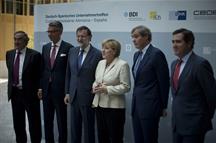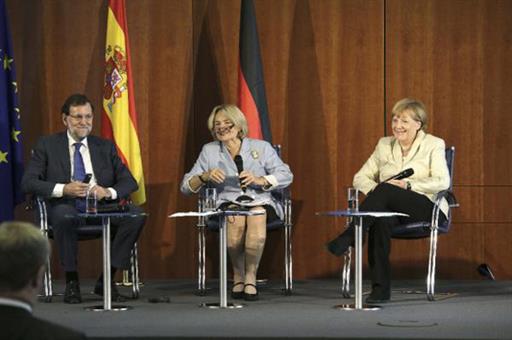Mariano Rajoy underlines "strong interconnection" between Spanish and German economies due to their dynamic nature and European integration
President's News - 2015.9.1
Berlin (Germany)
In his speech at the business meeting, organised by the employers' associations of the two countries as part of the Schloss Meseberg Informal Summit, Mariano Rajoy said that economic relations between Spain and Germany are going through "a particularly buoyant time".
The President of the Government of Spain added that Germany continues, "year after year", to be "our main supplier worldwide and our second-largest customer". He went on to add that trade exchanges grew by almost 11% in 2014 and have reached an all-time high in the first half of this year by exceeding 31.3 billion euros.
The President of the Government stressed that these bilateral relations are also growing stronger in the service sector. "Long gone are the years in which Spain exported little more than sun and sand tourism", he said. In 2014, over half of Spanish revenue from services came from areas other than tourism and travel, such as engineering, consultancy, telecommunications and transport, he explained.
In terms of investment, added Mariano Rajoy, the latest data also reflect the "strong interconnection" between the two economies: Germany is the fourth-largest investor in Spain and Spain maintains direct investment in Germany of close to 10 billion euros.
The President of the Government believes that these figures can be explained "by the excellent progress" seen in the economies of the two countries and also by "the increasingly stronger European integration". As regards Spain, he said, "the trend shift in our economy can is clearly evidenced by the strong export growth over GDP - nine points in the last five years; Spain is exporting more than the leading developed economies, second only to Germany".
Change of cycle
Mariano Rajoy referred to the "radically different" circumstances in which he gave his last speech at this business forum, "in 2012, when my country was struggling with the worst obstacles of an economic crisis worsened by turbulences at a European level over the Euro".
 Pool MoncloaThree years later, he said, "nobody doubts the irreversible nature of the Euro and my country, which was previously posting the worst figures in terms of job losses and negative economic growth is now posting growth of over 3% per year and creating more than half the new jobs in Europe".
Pool MoncloaThree years later, he said, "nobody doubts the irreversible nature of the Euro and my country, which was previously posting the worst figures in terms of job losses and negative economic growth is now posting growth of over 3% per year and creating more than half the new jobs in Europe".
Furthermore, the economy is growing and jobs are being created with prices at moderate levels and with sustained improvements in the foreign trade sector, the arrival of tourists, the creation of new companies and foreign investment.
The President of the Government said that all of society - and Spanish businesses in particular - have helped return Spain "to the right path". Now is the time, he said, "to persevere" and aspire to the "great national objective for the next four years": achieving a figure of 20 million Spaniards contributing to the Social Security system. In his opinion, this is an acceptable challenge - to create 500,000 jobs per year - when some 600,000 will be created in 2015 alone.
Greater European integration
"Europe has also played a very important role, as has the common currency", in this recovery process, stressed Mariano Rajoy. He believes that progress has been made in recent years on European integration "but we must keep working to achieve full integration".
"In this regard, we have maintained an active and constructive position in Spain and we have contributed important aspects of debate for reforming our governance of the economic and monetary union. For a monetary union to function properly, the core idea is that there needs to be a certain degree of synchronisation between the economies of the countries that form part of that union", he said.
Mariano Rajoy advocated a more integrated internal market in such areas as energy, retail banking and the digital agenda, as well as ensuring that the public benefit fully from those measures. In particular, this will "require progress to be made on labour mobility". He also called for improved coordination of economic policies and for steps to be taken in the field of fiscal harmonisation, "with initiatives to combat the erosion of tax bases and the artificial transfer of profits, as well as measures to improve the fight against tax fraud".
Q&A session with business leaders
After his speeches at the closing ceremony of the meeting, the President of the Government of Spain and the German Chancellor held a Q&A session with representatives from the German and Spanish companies attending the event.
As regards the role of small- and medium-sized enterprises, Mariano Rajoy highlighted the importance of having an extensive business fabric, SMEs especially, as that provides "stability" and "certainty" to a country. The President of the Government reviewed the measures adopted over the course of this legislature to support SMEs, such as the National Insurance discounts, and said that there would be a need in the future to focus mainly on improving training and qualifications.
In another of his answers, Mariano Rajoy denied that "Spain lives from construction". He insisted that Spain has a highly diversified economy, as shown by the export figures and the fact that 46% of Spanish GDP is invested by Spanish companies overseas.





